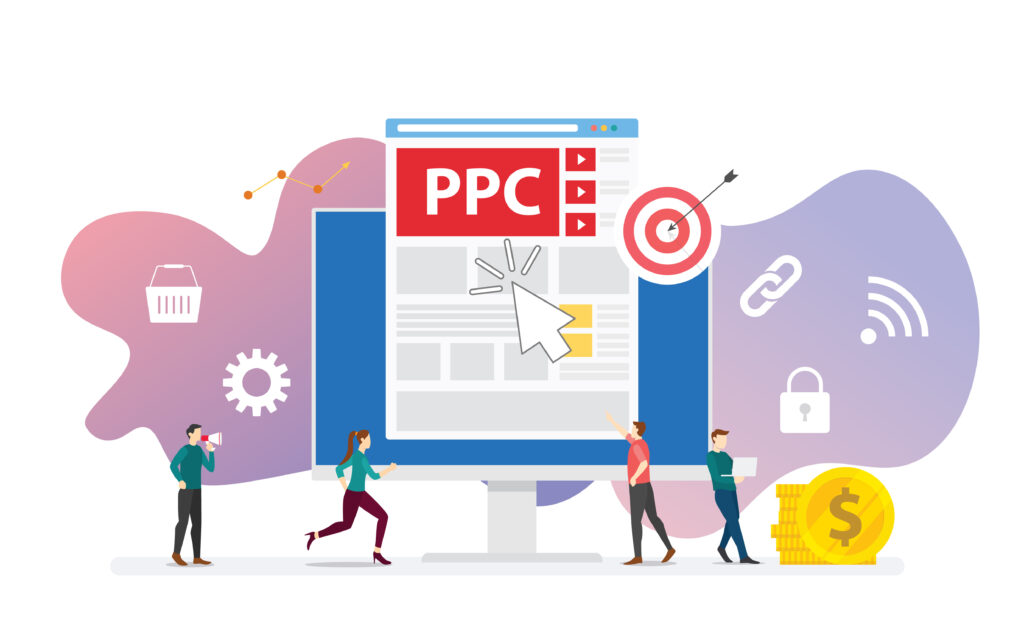Proving the value of media investments has never been more critical. Every dollar spent is under the microscope. Marketers need to keep a close tab on how they allocate budget and the return on investment (ROI) of their media placements to optimize ad spend and maximize campaign impact on the bottom line.
Search engine marketing (SEM), or paid search, starts with effective bid management. Delivering ads to the wrong audience or at an inopportune time in the customer journey has never been more costly, especially as consumers navigate advertising at every corner. Fortunately, a range of advanced paid search bidding strategies can ensure your brand messages reach customers when they’re searching for your products or services.
This article covers the most effective bid management strategies brands can leverage to get more bang for their buck in SEM.

What Is Bid Management?
Paid search is a form of advertising that increases a website’s visibility on search engine result pages (SERPs). Marketers usually bid on keywords, typically through Google Ads and Bing Ads, to serve their content when prospects enter a search query. The goal is to maximize ROI while minimizing overall ad spend.
Because the search landscape offers massive reach and fast results, marketers can see what’s working (or not) in real time and adjust as needed. This means that effective bid management is an agile and iterative process. To get the most out of their investments, marketers should be ready to dig into the data at every stage of the process. This includes setting budgets, identifying the right bidding strategy, tracking bid performance, and optimizing for the future.
How To Implement an Effective Bid Management Strategy
Before delving into advanced bidding strategies, we’ve outlined the high-level steps marketers can take to implement the right bid management strategy. They include:
- Setting clear key performance indicators (KPIs): Define your goals, such as increasing conversions, achieving a specific return on ad spend (ROAS), or driving clicks.
- Defining your audience: Identify which demographics, psychographics, and behavioral traits define your target customers.
- Identifying a strong bidding strategy: Choose a strategy that aligns with your campaign objectives, whether automated or manual.
- Monitoring performance: Track outcomes to ensure the algorithm achieves the desired results.
- Iterating, iterating, iterating: Adjust your strategies based on the results to keep pace with the fast-evolving digital landscape.
Advanced Paid Search Bid Management Strategies
As competition increases and advertising platforms grow in complexity, AI and automation have become key to effectively managing bid strategies. Marketers must adopt new methods to stay ahead of the curve. Here, we outline several advanced bid management strategies and how they can be applied to drive business results.
Select a Bid Strategy Based on Campaign Objectives
An effective bid management strategy in paid search starts first and foremost with a strong understanding of the campaign’s desired outcomes. Whether increasing brand awareness, pulling market share away from competitors, or generating new leads, marketers need a clear framework for goals and the steps necessary to achieve them.
There are three primary objectives to consider in bid management:
- Traffic: If you’re focused on driving brand awareness with website traffic, consider strategies prioritizing clicks. If you’re focused on driving brand awareness through website traffic, consider strategies that prioritize clicks, such as Maximize Clicks.
- Conversion: If your primary goal is to generate conversions, consider bid strategies designed to maximize actions or achieve a specific cost per acquisition. Strategies like Target Cost-Per-Acquisition (CPA), also known as cost-per-conversion, maximize conversions, and enhanced cost-per-click (CPC) are suitable for conversion-oriented campaigns.
- Revenue: If your goal is to achieve a specific return on ad spend, Target ROAS is the most appropriate strategy. This will maximize revenue relative to ad spend, ensuring profitable campaigns.
Budget plays an important role in defining your campaign goals. For example, generating new leads is far more costly than generating clicks to your website. So, if you have a loftier goal, be prepared to spend more. If you’re not quite sure how much you want to spend yet, start with a more attainable goal and iterate based on results.
Modify Bids by Device, Location, and Audience
Bid modifiers allow you to adjust bids for a specific cohort without changing the targeting of your campaign or ad group. This allows marketers to fine-tune their bidding strategy to reach the most valuable segments of their target audience. There are three main modifiers to consider:
- Devices: Adjust bids based on the device used by the user, such as desktop, mobile, or tablet. This is useful for campaigns targeting people on specific devices. For example, if mobile users have a higher conversion rate, you can increase bids for mobile devices.
- Location: Adjust bids based on geographic location, such as country, state, city, or even neighborhood. This is useful for campaigns with a local or regional focus. If your business operates in specific regions, for example, increasing bids in those areas can drive more local traffic.
- Audience: Adjust bids based on specific demographic groups, interest-based segments, or remarketing lists. This is useful for targeting high-potential segments while minimizing spending on less valuable ones. For example, if you’re running a remarketing campaign, you can increase bids for users who have previously interacted with your website.
Bid modifiers are valuable to advertisers for improving targeting, performance, and ROI. Why? They help you target specific groups of people you know already respond well to your campaigns. Ultimately, it allows marketers to prioritize their most valuable audiences at scale.

Tap into Automated Bidding
Manual bid management is time-consuming. Innovations in automation have paved the way for automatic bid adjustments based on real-time factors, such as competition or user behavior. Automated bidding can significantly reduce manual effort while improving performance.
Below, we outline critical automated bidding strategies offered by Google Ads, Bing Ads, and other search platforms:
- Target CPA: Adjusts bids to meet a specific cost per acquisition or conversion, ensuring a consistent cost for each conversion.
- Target ROAS: Adjusts bids to ensure that the revenue generated from conversions meets or exceeds the target return on ad spend.
- Maximize clicks: Adjusts bids to generate the maximum number of clicks within a specified budget to drive traffic and brand awareness.
- Maximize conversions: Adjusts bids to generate the most conversions within a specified budget.
- Enhanced CPC: Adjusts bids to increase the chances of conversions while staying within a budget. This allows some manual adjustments.
Automated bidding strategies reduce the time and effort required to manually manage bids, allowing marketers to focus on strategy, creative work, and other high-impact activities. However, automated bidding strategies rely heavily on data, so it’s imperative that you closely monitor campaign outcomes to ensure that you’re driving optimal campaign results and can make optimizations as needed.
Monitor and Respond to Competitive Strategies
Competitive bidding can be a powerful tool for brands to maintain industry visibility and grab increasing market share. Ultimately, the goal is to meet customers searching for your competitors and diverting them to your own brand. This allows new customers to discover your brand and builds credibility over time.
There are a range of ways to bring this strategy to life. For example:
- Raise bids on competitors’ primary keywords to maintain or improve ad positioning relative to other brands.
- Optimize for Target Impression Share, which allows advertisers to set a target percentage of ad impressions they want to receive in auctions.
- Consider long-tail keywords that are lower competition but still reach the same audience.
To successfully execute this strategy, marketers need an astute understanding of their competitors’ primary keywords and bidding behaviors. This context will set you up for success so you can identify the best ways to break through the “noise” and remain top-of-mind for your customers (and your competitors’ customers).
Leverage AI and Predictive Insights When It Makes Sense For You
Artificial intelligence (AI) can help make real-time decisions about bid strategy adjustments. This includes adapting to changing market conditions, competition, and user behaviors without manual intervention. Predictive insights can offer data-driven forecasting to highlight future trends and help marketers decide how to optimize bids accordingly.
These automated adjustments can help save time and reduce manual work while still allowing marketers to drive the underlying bidding strategy. As with any new technology, marketers need to test and learn how AI and predictive insights can be best leveraged for their unique advertising goals.
Monitor Performance and Iterate Continuously
Tracking performance and iterating on your strategies is critical to success. Without proper tracking, it’s impossible to know if your efforts yield desired results, and without iteration, you risk stagnation in a rapidly evolving landscape.
If you’re just getting started with paid search, don’t be afraid to test different strategies to determine what works best for you. Even if you’ve implemented an automated bidding strategy for your campaign, some degree of manual control and monitoring will pay dividends.
Review available data and extract takeaways you need to optimize performance against your goals. Adjust your automation strategy as needed if your strategies aren’t meeting them.
Trust J&L Marketing To Maximize Paid Search ROI
Working with an expert partner like J&L Marketing to help you manage your bidding strategy in search engine marketing makes all of the difference. We perform extensive research to understand your competitors and ensure your content breaks through the noise. Dedicated, certified J&L analysts will dig deep into the data to continuously optimize performance. And, as a Google Premier partner, we can keep you apprised of the latest paid search innovations to ensure you’re well ahead of your competitors.
Looking to go further than search engine marketing? J&L Marketing also offers services for social media paid advertising, display advertising, YouTube marketing, direct mail, and more. Get in touch today!



